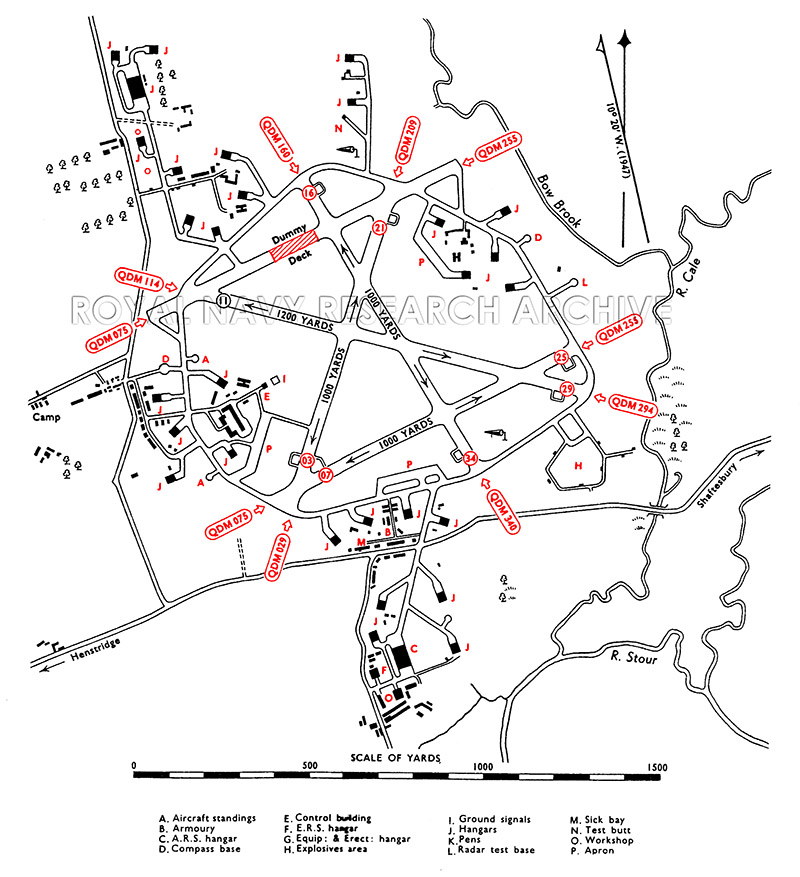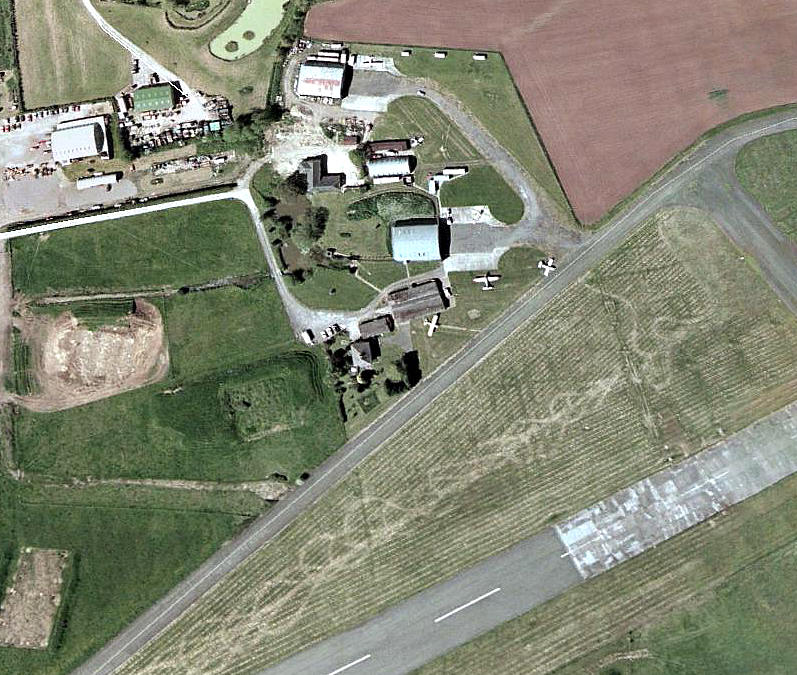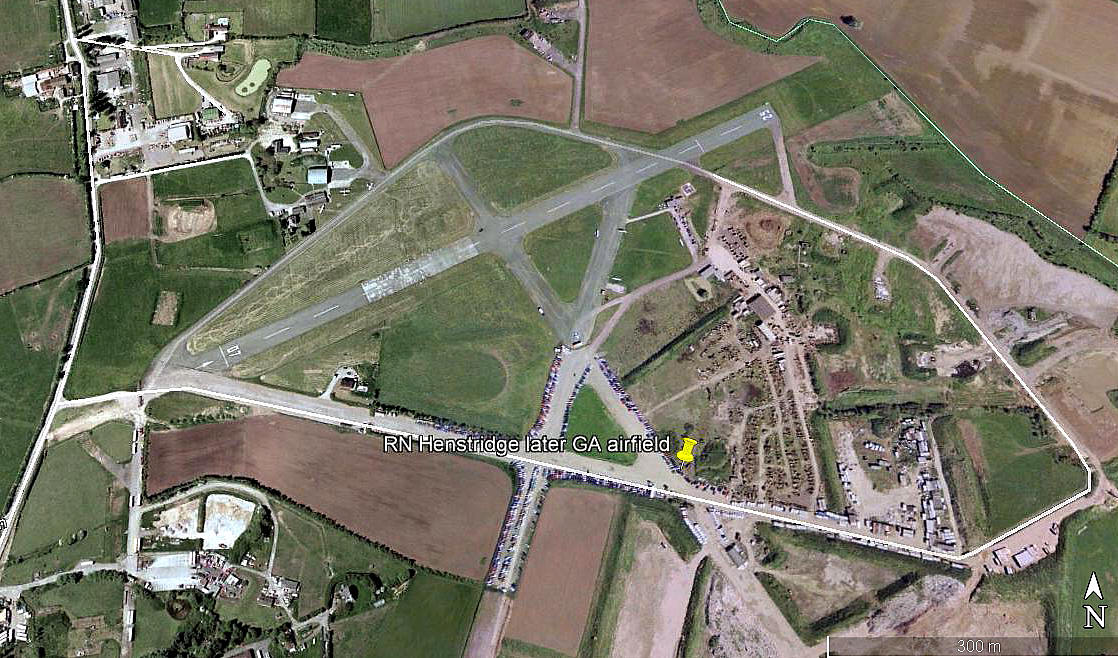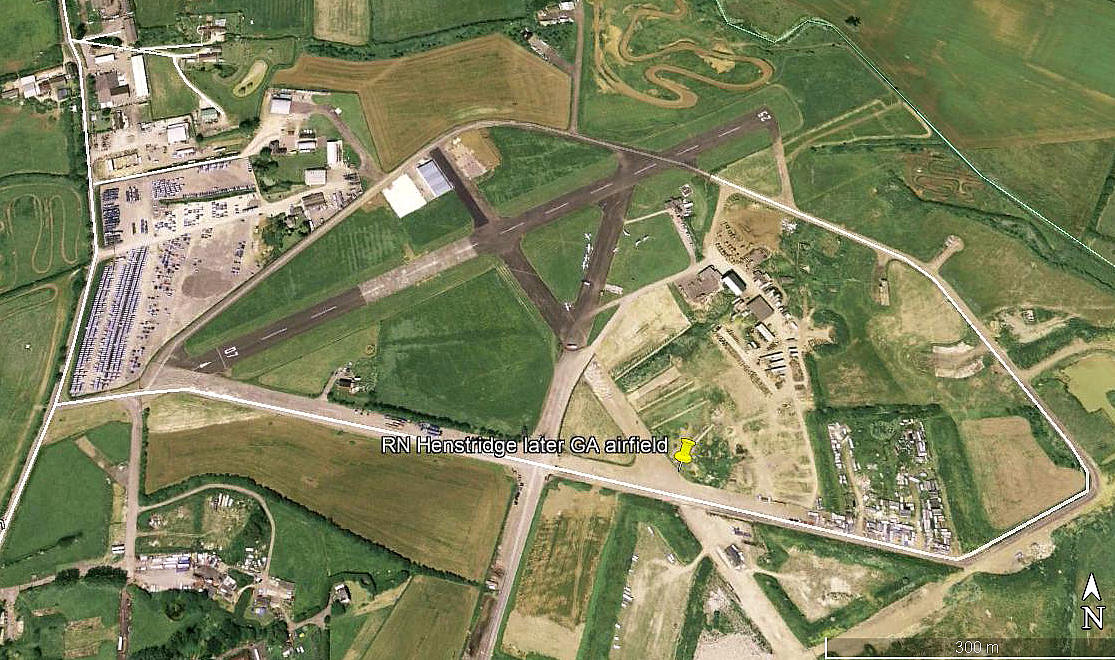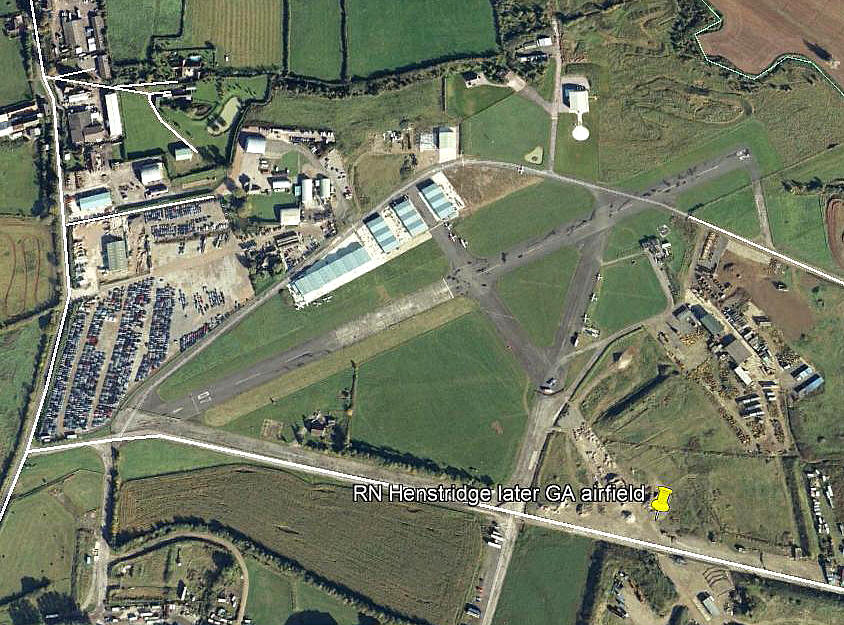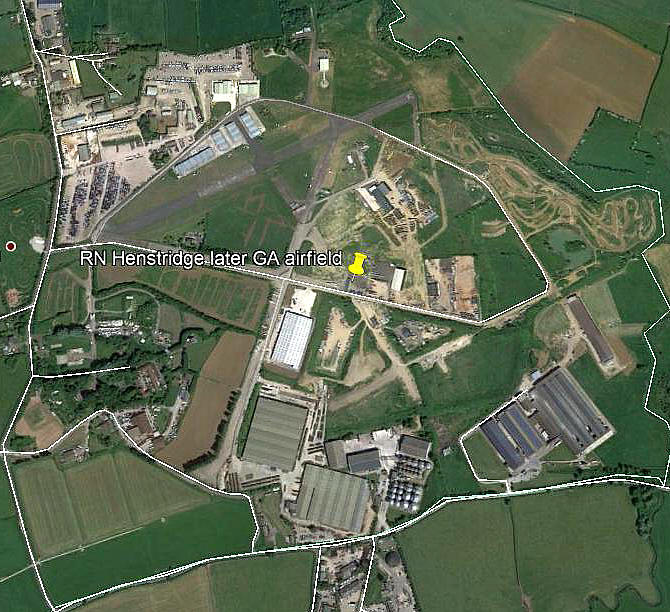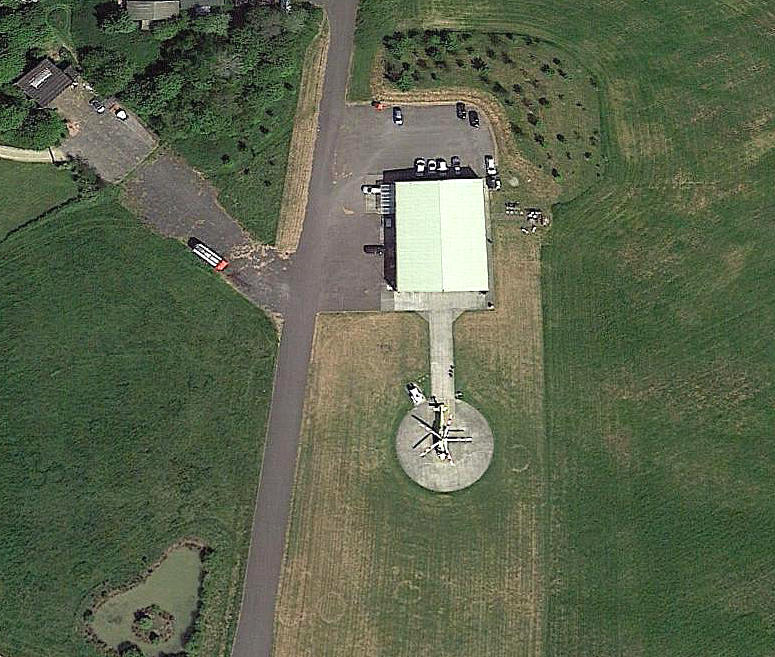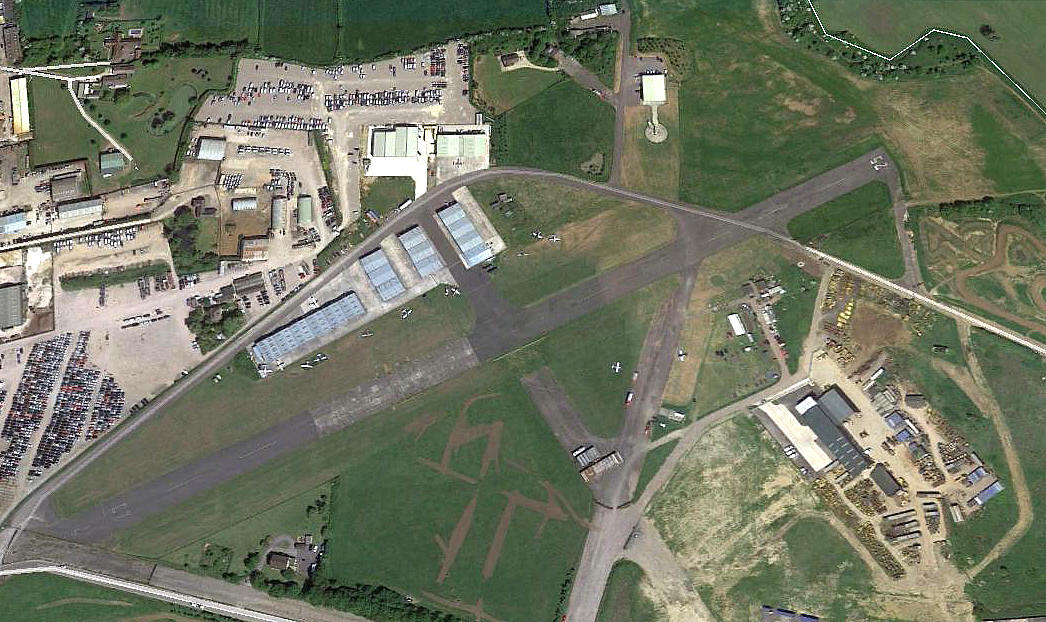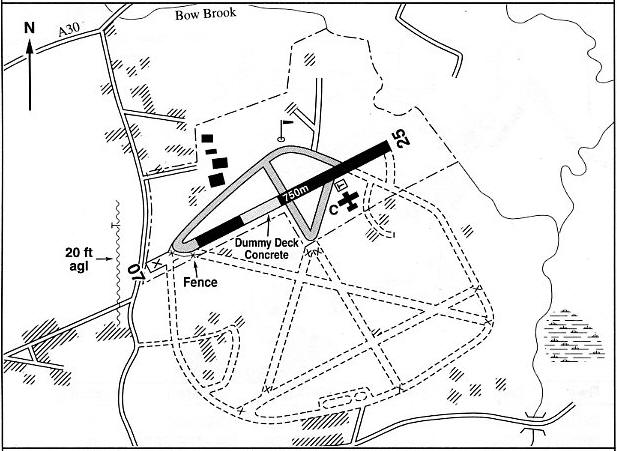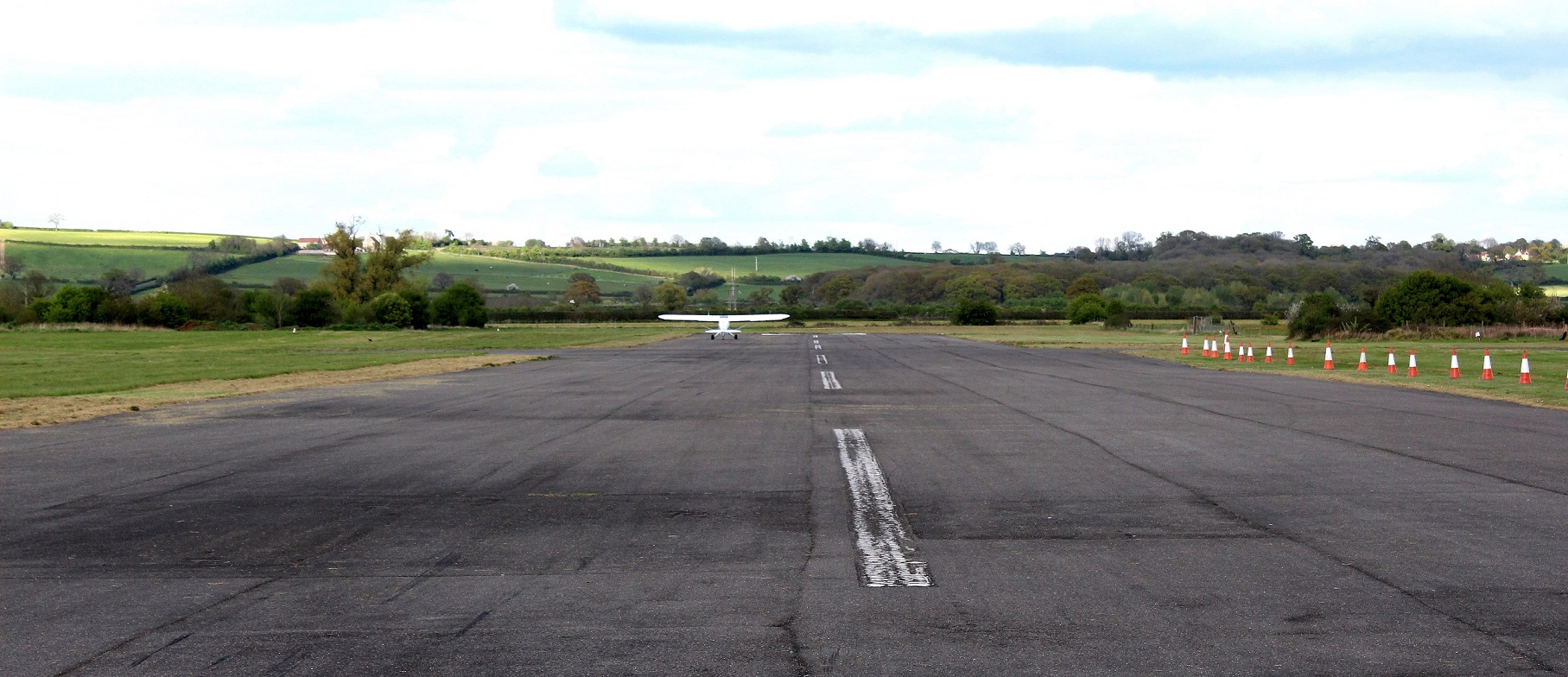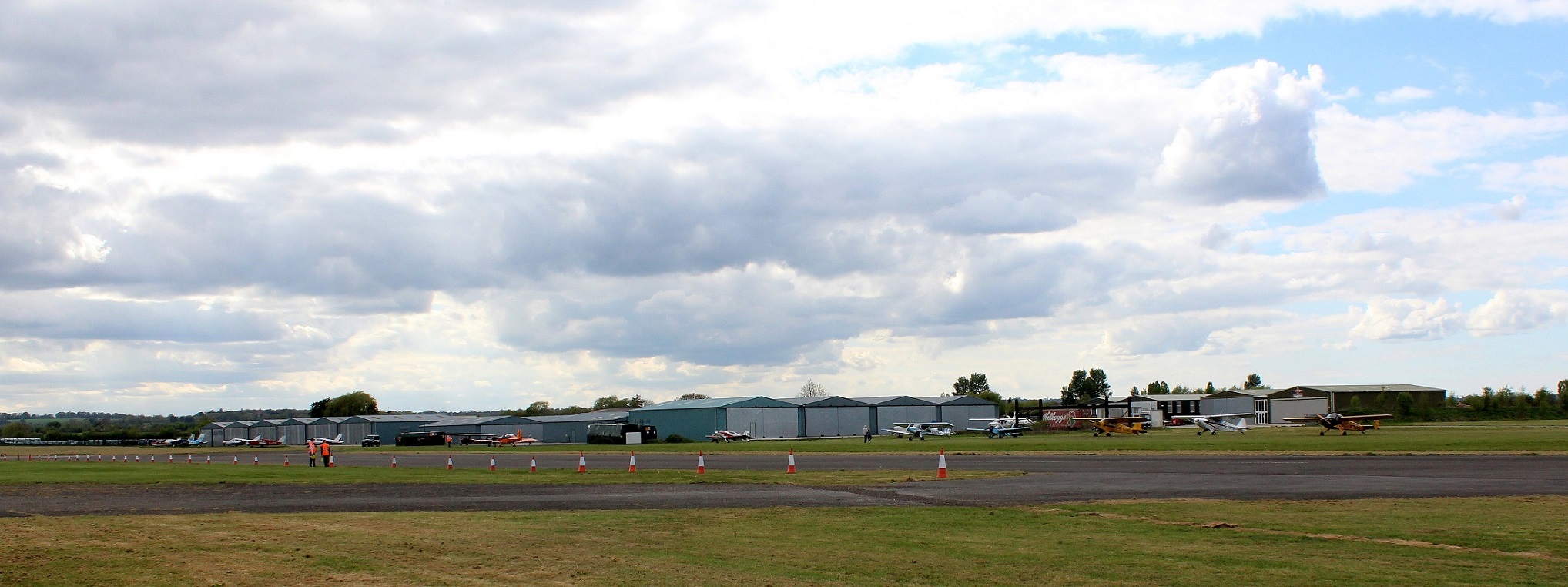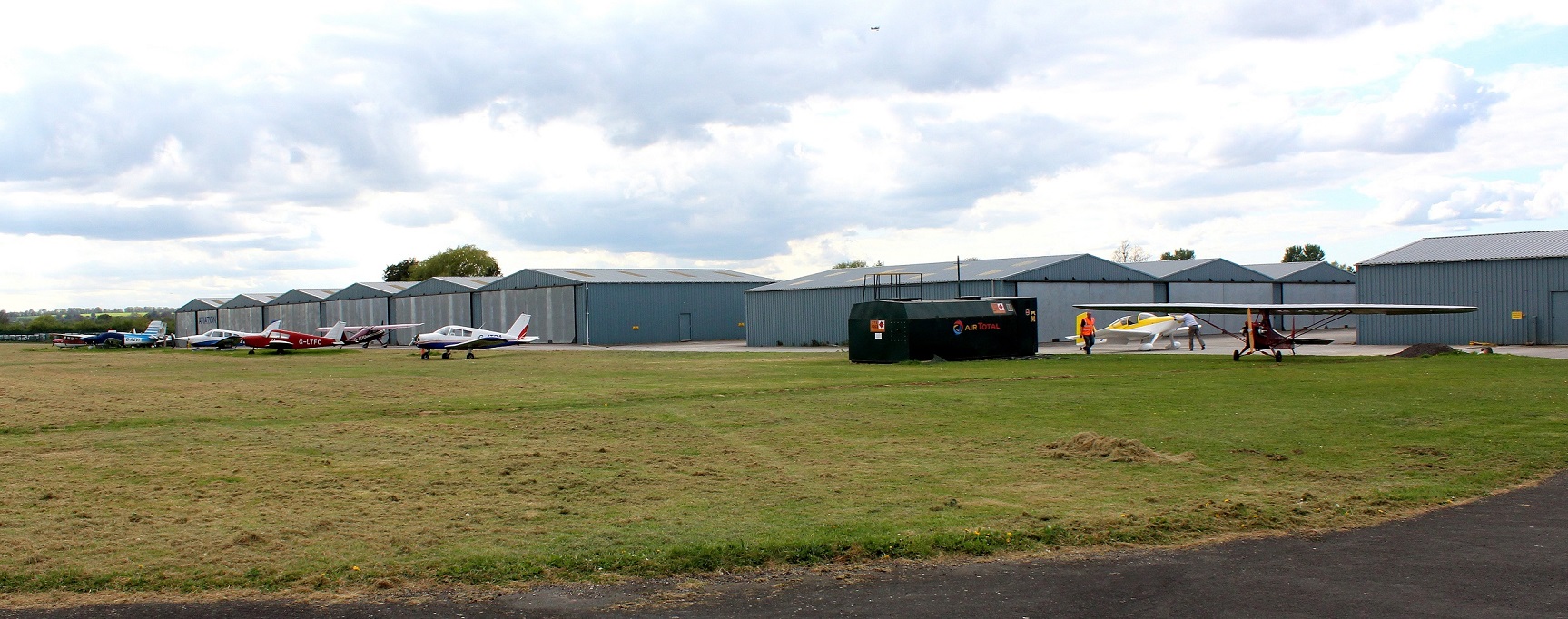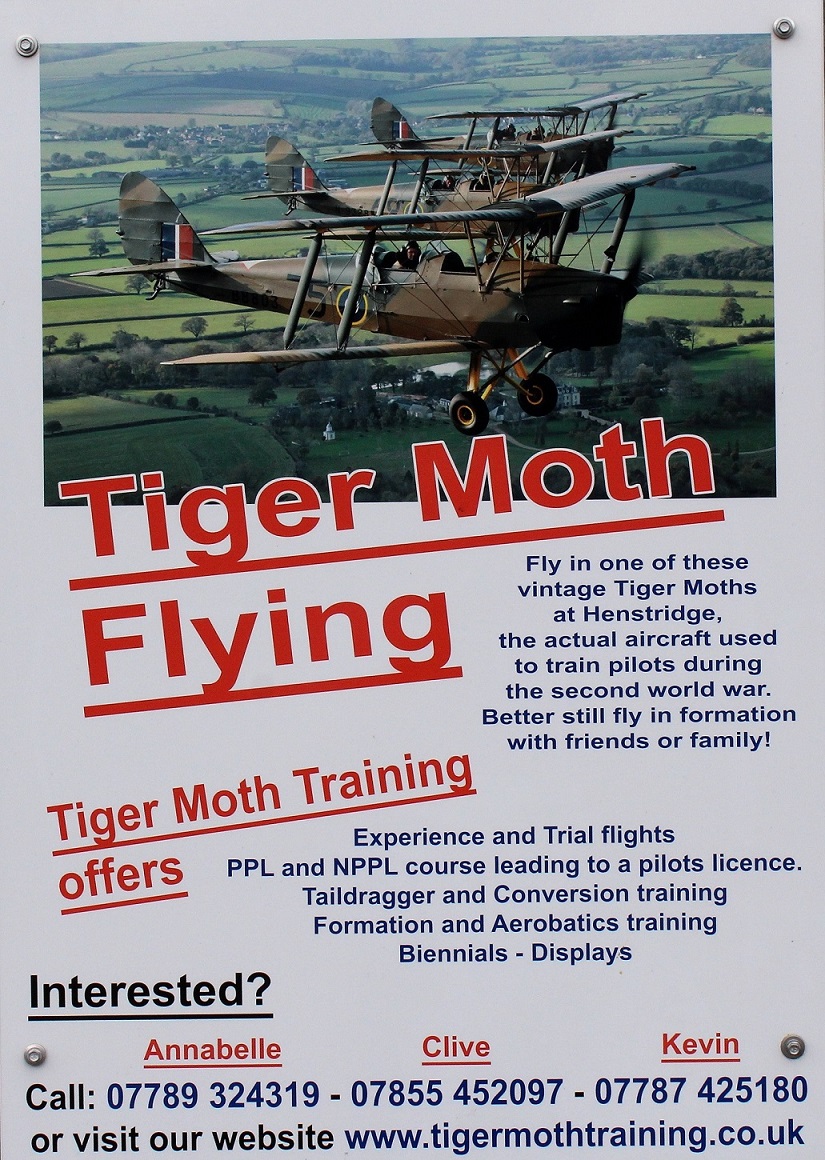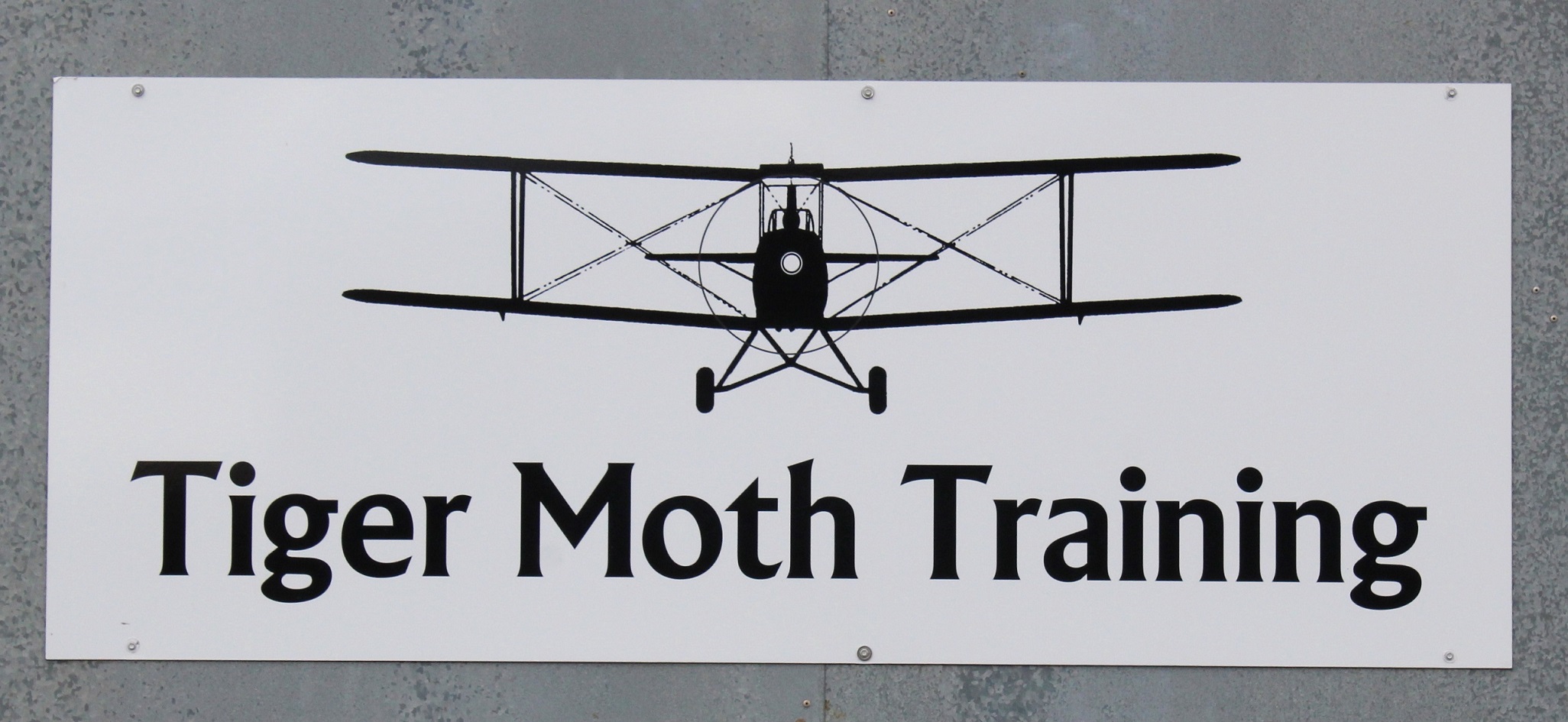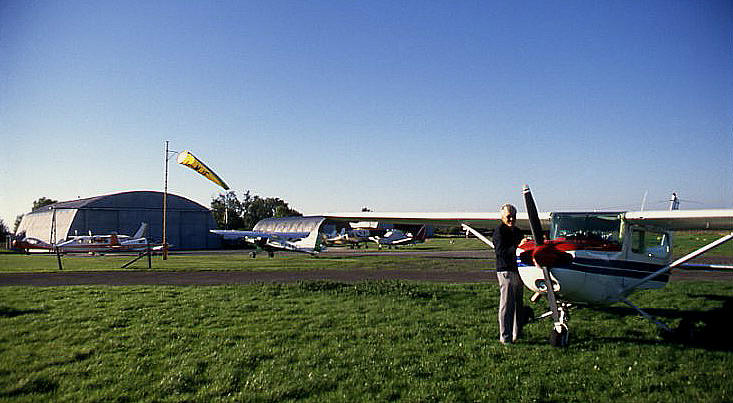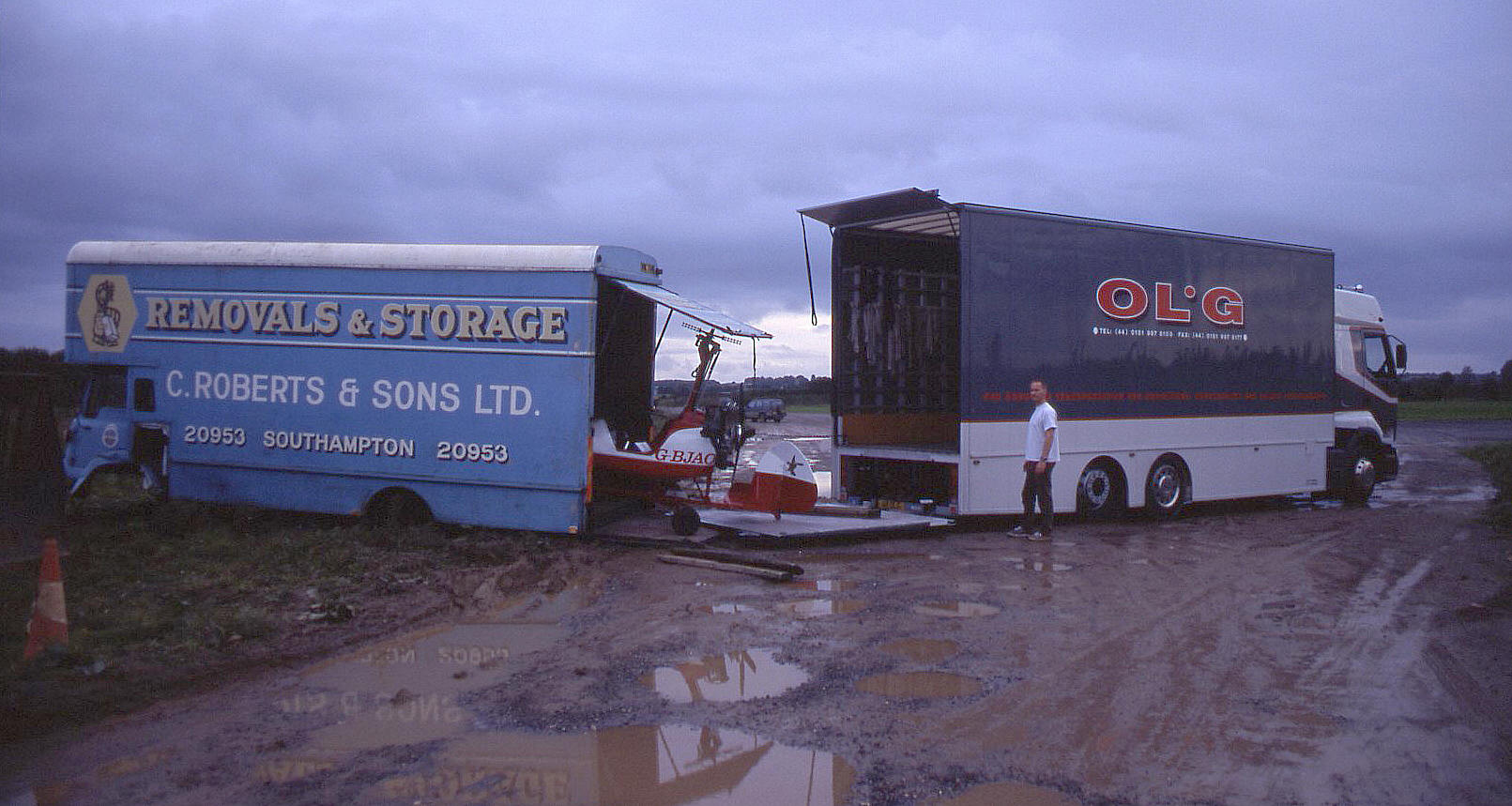Henstridge
HENSTRIDGE: Military aerodrome, Royal Naval Air Station, (HMS DIPPER 1948, Books of HMS HERON at RNAS YEOVILTON)
Now civil aerodrome
Note: The helipad, (7th picture), is for the Dorset & Somerset Air Ambulance.
Apart from the first map, (copyright unknown?), the remaining seven pictures were obtained from Google Earth ©
Military users: WW2: RN Fleet Air Arm Flying Training.
From April 1943 home to No.2 Naval Fighter School (Vickers-Supermarine Seafires and Spitfires, Blackburn Barracudas and Miles Masters)
After WW2 until 1957 it appears you would have seen mostly Fairey Fireflys and Hawker Sea Furys
Civil operator: 1984: Mr B Mogg
2000: Henstridge Airpark Ltd
Activities: Post 1957 - GA private, maintenance and gyroplane including training
Flying School: Tiger Moth Training
Gliding: Dorset Gliding Club: Aerotows in the early 1980s?
Location: S of A30, ENE of Henstridge Marsh village, 5nm SSE of Wincanton and 10nm NE of Yeovil
Period of operation: Military 1943 to 1957. Then civil to present day (Continuous operation?)
Reproduced with the kind permission of Pooleys Flight Equipment Ltd. Copyright Robert Pooley 2014
Runways: WW2: 02/20 914x27 hard 11/29 1097x27 hard 16/34 914x27 hard
And, two parallel runways: 07/25 both 914x27 hard
2000: 07/25 750x26 hard
Note: I think it is interesting to recognise that in WW2 virtually all aerodromes operated by the Fleet Air Arm had 'non-standard' runways.
In around 2013, possibly 2014, a grass runway was laid out parallel to 07/25 for use, mostly, by Tiger Moth Training?
NOTES: Amongst the 653 WW2 military aerodromes extent in 1944 there was of course an enormous variety of hard runway aerodrome layouts. Even amongst the ‘standard’ three runway ‘A’ frame configured aerodromes I’d be surprised if even two were exactly identical. HENSTRIDGE had five runways! However, I’m pretty confident that HENSTRIDGE was unique in having two parallel runways identical in length and breadth.
In fact I think I’m correct in thinking that only HEATHROW later on shared this distinction but it had three sets of parallel runways under construction initially when it opened as a major civil airport; but only one ‘set’ of which became operational; 09/27 Left and Right. The others became taxyways with the exception of runway 23 which was used (latterly for landings only) when strong sou-westerly were blowing .
It certainly does appear that HENSTRIDGE was the first aerodrome in the UK to have five runways? Incidentally, even as late as 2014, it appears the dummy ‘aircraft carrier flight deck’ marked out on 07/25 (N) could still be seen.
On Easter Monday, the 1st April 2013, a Fly-In was staged to celebrate the 70th birthday of this aerodrome.
APRIL 2017 FLY-IN AND AIRFIELD PICTURE GALLERY
On the 23rd April 2017 I paid a visit to HENSTRIDGE for the Fly-In, on the invitation of Clive Davidson (see Tiger Moth Training below). I fully expected it to be a fairly low-key event, probably with just a few dozen aircraft visiting at best.. I could not have been more mistaken, and possibly the organisers were even more amazed as some 150 aircraft arrived. On a personal note, apart from the great pleasure of meeting up with Clive again after so many years, I also saw several aircraft which I have moved in my truck, and at least one I have flown in for an aerobatic sortie many years ago before I gained my PPL, the Chipmunk G-APYG. So many happy memories that day.
TIGER MOTH TRAINING
The formation of Tiger Moth Training in the second decade of the 21st century deserves a special mention. Unlike the few other flying schools or clubs operating the Tiger Moth in the UK their three aircraft (There might be more when you read this) have all been restored to, (as near as humanly possible), ‘as new in 1944’ military specification. It seems the only modern addition is a discreetly fitted radio.
In the June issue of Pilot magazine Peter R March tells us the history of these three Tiger Moths. NM138 (G-ANEW) was built by Morris Motors at Cowley in 1943 and first served with No 29 EFTS at RAF Clyffe Pypard in Wiltshire. The second was built as G-ADWJ and delivered to Scottish Aviation at Prestwick in 1935, flying with No 12 EFTS. It was impressed into RAF service in 1939 as BB803. The third example was built by de Havilland at Hatfield in late 1939 and taken on charge by the RAF as N9328.
I was interested to learn that Kevin Crumplin who formed Tiger Moth Training had been joined by Clive Davidson and Annabelle Burroughs to run the operation. It was Clive Davidson who took me for an assessment flight in the Slingsby T67B G-BONU with Delta Flight at Leavesden on the 30th September 1988 to see if I could qualify for a fixed price PPL course. During this ‘assessment’ he taught me to aileron roll the aircraft and I am pleased to say he judged me as capable. Perhaps Clive did this with all the other hopefuls but I have never heard of any other prospective student pilot at any other flying school having such a wonderful experience on their first ‘trial lesson’. I cannot take any credit for this as Clive is such a wonderful instructor that I strongly suspect he could easily teach a half-drunk chimpanzee to do the same.
In the December 2014 issue of Light Aviation Clive Davidson has provided an excellent article giving much detail on how this school operates, and, some of the pictures really are superb.
A COUPLE MORE PICTURES
Both of these pictures, from postcards, were kindly sent by Mike Charlton who has an amazing collection. See: www.aviationpostcard.co.uk
I did have both of these pictures listed in my article: 'Sites to be identified'. In March 2019 Mr Simon Smith kindly contacted me to say these two aircraft were at HENSTRIDGE in early 1990. Then in May 2019 Captain Bryn Wayt kindly pointed me in the direction of two websites, each of which contained additional information.
The two pictures did, for me, have a strong 'whiff' of HENSTRIDGE, so armed with this extra information I have now moved them here. But, I still cannot be 100% certain. If anybody can kindly confirm that they were indeed taken at HENSTRIDGE, this advice will be most welcome.
Note: Picture by the author.
A PERSONAL MEMORY
On the 8th October 1995, Guy Browning and I decided to fly from Top Farm to Henstridge and then Compton Abbas. In effect one our first flights together to the 'West Country'. It was interesting for us, having both learnt to fly at Wycombe Air Park, to see how the atmosphere at Henstridge (and Compton Abbas) seemed so much more infused with an overall enthusiasm for aviation compared with the airfields around London.
MOVING AIRCRAFT
In late 1999 I was given the job of moving the Montgomerie-Bensen B.8MR gyroplane G-BJAO from ANDREWSFIELD in ESSEX to HENSTRIDGE where storage had been arranged in a semi-derelict Bedford removals van. The picture shows the transfer being made in the evening. As you can see from the picture, moving aircraft did mean often going to the most glamorous of locations!
Clive Davidson
This comment was written on: 2016-12-08 16:07:51Nice review...and good toner of you and glad you have continued to fly! Many Happy Landings, Clive
Reply from Dick Flute:
Dear Clive, Wonderful to hear from you. I still lunch out on you teaching me to aileron roll during a first assessment flight for a PPL. And of course much admire your first class articles in Light Aviation magazine. Very best regards, Dick
We'd love to hear from you, so please scroll down to leave a comment!
Leave a comment ...
Copyright (c) UK Airfield Guide














